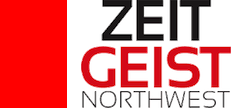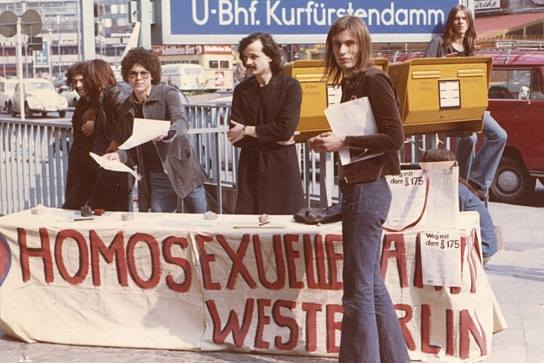Date/Time
Date(s) - 06/12/2019
7:00 pm - 9:00 pm
Categories No Categories
CELEBRATING PRIDE MONTH
Germany’s infamous Paragraph 175, which had made sexual acts between men a criminal offence since 1872, was only officially repealed in 1994. However, since the 1960s – with West Berlin being the only place were men could at least dance with other men – there had been public locales there, which became a refuge for young gay men from the Federal Republic. Using hitherto unpublished and often provocative archive material, and with support from many contemporary witnesses, Jochen Hick in this documentary film is researching the historical development of the gay scene from its antecedents until today.
A PanAm Boeing jet flying across the Berlin skies. This American airline, one of the three western allies’ operators, has long since ceased to exist. Tempelhof airport, too, in the former American sector of the divided city, was closed years ago. Jochen Hick lets MY WONDERFUL WEST BERLIN begin with references to the nineteen-sixties, a time when West Berlin held exceptional status in so many ways, not just politically. There were liberal pockets in the western parts of Berlin, that didn’t exist elsewhere in the Federal Republic. Perhaps a tradition harking back to the “Roaring Twenties“ of the Weimar years contributed as well as the fact that the arch-conservative politics of the far-away Bonn Republic were harder to implement here. No other German city permitted men to dance with other men in public. West Berlin became a refuge and a magnet for German gays. Many of Jochen Hick’s contemporary witnesses were not born in Berlin.
René Koch, for instance, a make-up artist, who settled in four-partite Berlin in the nineteen sixties. He recalls the many ruins that still abounded, say in Fasanenstraße, but with garden swings behind the broken street fronts, symbolising an unbridled desire to enjoy life and have fun. Film-maker Rosa von Praunheim was born in Riga and, after many detours, came to Berlin in 1962; publisher Egmont Fassbinder, a cousin of Rainer Werner Fassbinder’s, moved here in 1969. Klaus Schumann, tailor and couturier, initially moved to liberal Switzerland in 1957, before returning to West Berlin four years later only to note that not much had changed, not even the fraught relationship with his mother.
Gays contributed to how a sub-culture evolved in West Berlin that was unlike anything that had ever existed in any other German city. MY WONDERFUL WEST BERLIN concentrates on the places where the scene met, the legendary and now mostly shuttered clubs and drinking holes, its artists and activists. Schöneberg even boasted an all gay commune – it too disbanded long ago. Property sharks contributed to the demise as much as the AIDS epidemic, which heavily impacted on hard fought-for structures such as HAW (Homosexual Action-group West Berlin). Jochen Hick’s documentary is at its most fascinating when it blends historic with political references, like when a “Gay Block” makes a naive attempt at marching side-by-side with industrial workers during a 1 May protest march in 1972; when in fact most of the very straight lefties were hardly gay-friendly, least of all among the working classes.
MY WONDERFUL WEST BERLIN has become a unique chronicle of the early beginnings of a gay movement in post-War Germany, enlivened by its varied and often visually provocative archive material. At some stage the wild years were over. Activists had died of AIDS, the mere horror of the virus as well as increased, albeit hard won, social acceptance contributed to the demise. Tellingly in 2001 mayoral candidate Klaus Wowereit came out publicly as gay and went on to become Governing Mayor, holding office until 2014. Soon after, some of the early activists were officially honoured with an Order of Merit of the Federal Republic. MY WONDERFUL WEST BERLIN is an occasionally pained, but often optimistic attempt at recording a piece of gay history. “Otherwise we wouldn’t have a history!“
Biography
Jochen Hick was born in 1960 in Darmstadt. From 1981 until 1987 he studied film at Hochschule für bildende Künste in Hamburg (University of Fine Arts), and in Bologna. He has since worked as an author, film director, and a cinema and TV producer. Between 2007 and 2010 he was chief editor and deputy programme director for gay TV broadcaster TIMM. Jochen Hick also teaches at Berlin’s dffb.





